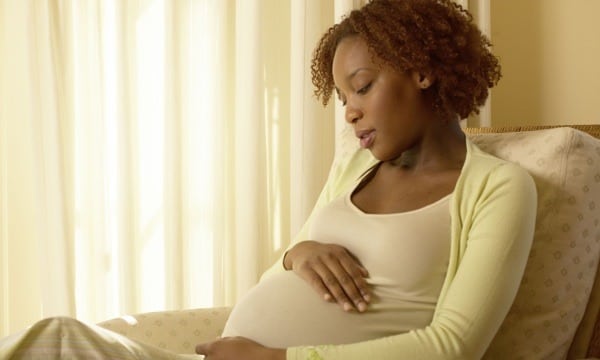 Not long ago a study released by Stephen Wu and Paul Hagstrom, both professors of economics at Hamilton College, revealed that black women aren’t happier when pregnant, unlike her white and Hispanic female counterparts. The report says this phenomenon spans socioeconomic strata and whether or not the black woman is married. The researchers suggest the unhappiness comes from a lack of social support.
Not long ago a study released by Stephen Wu and Paul Hagstrom, both professors of economics at Hamilton College, revealed that black women aren’t happier when pregnant, unlike her white and Hispanic female counterparts. The report says this phenomenon spans socioeconomic strata and whether or not the black woman is married. The researchers suggest the unhappiness comes from a lack of social support.
Wu says one explanation for the disparity may have to do with the social and emotional support that women receive when pregnant. Both white and Hispanic women reported enjoying more attention and help from their family and community while expecting, while black women actually reported receiving less support from others compared to black women who weren’t pregnant.
The only group of black women who reported a small peak in happiness while pregnant were those who said they currently lived with a partner. (Married black women didn’t report the same satisfaction, since their partners were not necessarily living with them and helping them with the pregnancy and parenting duties.)
Does this data surprise any of us? What with how black women are expected to be strong and independent, and apparently we’re the only human/non-human women who can reproduce without the help of a penis (we get ourselves pregnant, don’t you know. We sneak into men’s bedrooms with turkey basters and roofies.) With an out-of-wedlock rate startlingly approaching 80%, and virtually no social consequences for men who up and leave children peppered all over the place, it’s no wonder why black women can’t feel happy about being pregnant. And for the women who are married and still aren’t happy? The study suggests that those married women probably have men who have left or lend no support. So the question is…why is it that black women aren’t allowed to be happy about one of the literal elements of what it means to be feminine?
Rebecca Haines, media studies professor from Salem State University who is an expert on gender, says, “It’s a really surprising study, and it makes me want to know what’s going on in the culture to result in black women receiving less support from their communities when they’re pregnant.”
Indeed. What is going on in our culture that black women receive less support? I suspect it’s the same reason over 200 Nigerian girls could be kidnapped and sold for $12 under the radar of the “black media elite” for weeks. There’s an expectation that black women are supposed to bear all things without complaint. The “stronger” you are, the more approval you get. The more soft, and “womanlike” you are often brings criticism from both black men and women. If you can’t feel feminine during the very thing that sets you apart from a man, then there’s a problem.
I have a unique perspective on this, because I’ve been pregnant by both a black man (whom I was living with at the time) and years later and after marriage, pregnant three additional times by my non-black husband. When I was pregnant with my oldest daughter, I was not allowed to have morning sickness or be too tired to perform housekeeping. When I tried to express my feelings about my child’s father’s lack of support, he replied, “Well, my mother did it.” And that she did. She was also an unmarried mother, and he only spoke on what he had known…seeing his mother bear the burden and responsibility of everything while the father was free to impregnate three or four other women. I don’t blame Maxi’s father–you can’t fix something you have no idea is broken. And while he was an awful partner, he is a loving father. And for my daughter’s sake, I’m grateful for that.
On the other hand, being married into a family that has never had a single member conceived out of wedlock gave me a totally different perspective on being an expectant mother. My three months of constant morning sickness and fatigue never garnered mumblings that I was being lazy. When I had to be on bed rest for third trimester with my son, my mother moved in and my mother-in-law flew out from Connecticut for a month to tend to me. Housekeepers where brought in, courtesy of my husband’s mother. In another pregnancy, my husband gave me weekly shots of progesterone in my butt without complaint. Both my mother and my mother-in-law where married when they conceived to husbands who were supportive, plugged-in, and able to provide and protect their wives during their most vulnerable time. It had absolutely NOTHING to do with race, and EVERYTHING to do with values and a lack thereof. Take this in, and choose your man accordingly. In patriarchy, a society’s value of women must be displayed and evidenced by the men. When it is not, women are left vulnerable and on their own, as we can see evidenced in this study.
To read Part One of the Femininity series, click here.